Cold Mix Asphalt Vs. Hot Mix Asphalt: Which Is Right for You?

Composition Differences
Cold mix asphalt is created by emulsifying the asphalt binder with water and an emulsifying representative before mixing it with accumulation. The hot mix asphalt manufacturing process includes warming the aggregate and asphalt binder individually prior to incorporating them at the asphalt plant.
In addition, cool mix asphalt often tends to be much less thick and more adaptable than hot mix asphalt. This flexibility makes it better suited for locations with higher degrees of motion, such as driveways or roadways with rush hour. In contrast, hot mix asphalt is understood for its high sturdiness and resistance to rutting and fracturing, making it a recommended choice for highways and high-traffic roads where durability is crucial.
Installment Refine Variations
The procedure of mounting cool mix and hot mix asphalt displays noteworthy differences in their treatments and requirements. In comparison, hot mix asphalt requires an extra intricate installation process. Due to the heating requirements, hot mix asphalt setups are commonly carried out by professionals with specialized equipment, making certain an extra structurally sound and irreversible result.
Durability and Long Life Variables
When taking into consideration asphalt choices, longevity and long life are critical aspects to assess for long lasting sidewalk efficiency. Warm mix asphalt (HMA) is recognized for its exceptional longevity and long life. The high temperatures during the mixing and laying process enable better compaction, causing a denser and stronger sidewalk structure. This results in HMA being more immune to rush hour loads, rough climate condition, and the effects old contrasted to cold mix asphalt (CMA)
In terms of long life, HMA usually exceeds CMA as a result of its remarkable strength and resistance residential properties. HMA pavements have a longer service life, requiring much less frequent repair services and maintenance, which can convert to cost savings in the lengthy run. Additionally, HMA pavements are a lot more easily customizable to fulfill details project demands, further improving their resilience.
Cost Considerations
Taking into consideration the financial implications is an important element when reviewing the selection in between warm mix asphalt (HMA) and cool mix asphalt (CMA) for sidewalk projects. While the preliminary expense of warm mix asphalt is commonly greater than that of cool mix asphalt, HMA often provides a more affordable service in the long run due to its premium resilience and durability.
In addition to product expenses, it's necessary to take into consideration the expenses related to setup and upkeep when comparing HMA and CMA. HMA normally needs customized tools and experienced labor for proper installment, which can impact general task costs. Conversely, CMA is much easier to deal with and can frequently be used utilizing less complex techniques, potentially decreasing setup expenses. Ultimately, the choice in between HMA and CMA must think about not simply the preliminary expense yet additionally the lasting economic implications to establish the most economical alternative for the certain pavement task.
Environmental Impact Contrast
Contrast of the environmental impacts in between warm mix asphalt (HMA) and cold mix asphalt patch repair asphalt (CMA) reveals unique distinctions in sustainability methods. HMA production calls for high temperatures, bring about enhanced power intake and greenhouse gas discharges. The process likewise launches volatile natural substances (VOCs) and harmful air pollutants (HAPs) into the ambience. On the other hand, CMA is created and used at reduced temperatures, minimizing power use and discharges significantly. The lower production temperatures of CMA result in decreased gas usage and lower levels of CO2 discharges, making it an extra eco-friendly choice.
Moreover, using CMA often entails reusing existing asphalt pavement, promoting resource preservation and lowering the amount of waste sent out to landfills. This reusing facet further improves the sustainability of CMA compared to HMA. In general, when taking into consideration the environmental influence, CMA arises as a more environmentally sustainable choice due to its reduced power needs, minimized emissions, and the potential for reusing existing materials. By selecting CMA over HMA, roadway building and construction tasks can contribute positively to ecological conservation efforts.
Final Thought
Finally, the option between cool mix asphalt (CMA) and warm mix asphalt (HMA) depends upon various variables such as structure, installment procedure, toughness, durability, cost, and ecological impact. cold mix asphalt. While CMA offers a affordable and fast service for minor fixings, HMA ensures superior longevity and durability for heavy web traffic areas. Think about these variables carefully to figure out which sort of asphalt is the appropriate option for your paving needs

Thinking about the monetary effects is a crucial aspect when assessing the selection between warm mix asphalt (HMA) and cold mix asphalt (CMA) for sidewalk projects. While the preliminary expense of hot mix asphalt is normally greater than that of cool mix asphalt, HMA frequently offers a much more economical option in the lengthy run due to its remarkable toughness and durability. asphalt repair.Contrast of the ecological effects between hot mix asphalt (HMA) and cold mix asphalt (CMA) exposes unique distinctions in sustainability methods.In final thought, the choice in between chilly mix asphalt (CMA) and warm mix asphalt (HMA) depends on different factors such as make-up, setup procedure, longevity, long life, expense, and environmental impact